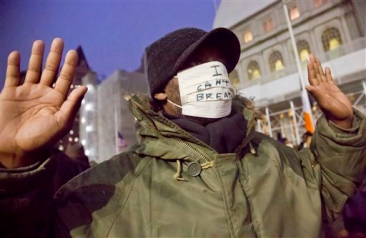By Olivia Balsamo
On Jan. 5, a Staten Island judge ruled that he would hear arguments over whether to release grand jury transcripts in the Eric Garner case, the man who died shortly after being placed in a chokehold by a police officer. The consequences of the grand jury decision last month not to prosecute the officer became clear when a steady campaign of protests and widespread outrage ensued.
If we were to rely on history, the availability of these documents would likely cause another resurgence of race-based political protests that have been dividing the country since the death of Trayvon Martin in 2012. This leaves the judge of the Eric Garner case with a rather difficult decision: to release documents which could further exacerbate racial tension, or to opt for what seems like the “safer route” and privatize the documents.
However, the latter leaves American citizens questioning what exactly led a jury not to bring criminal charges against the officer who, based on overwhelming evidence, was clearly guilty. Perhaps the additional information that would come along with the release of the documents would change opinions about the decision of the grand jury.
In this case, the decision is simultaneously difficult, yet simple. No matter what the judge decides, there will be repercussions.
Regardless of what the court documents have to offer about the case, there is no legitimate reason why the officer was not prosecuted. The protests on the streets of New York were evident of that.
In the case of Michael Brown, there were what critics called “gray areas:” although Brown has been dubbed a martyr for persistent racial discrimination, there were African American witnesses who testified that the officer was acting in self-defense, and that Brown was indeed the aggressor.
Such gray areas do not exist in the case of Eric Garner. Its most disturbing aspect, one even more disturbing than the video evidence and the autopsy report, is that this officer had no justification for his actions.
Eric Garner was not acting as an aggressor; at most, his resistance was his attempt to reason with the officers, before being violently thrown to the ground in a chokehold. If illegitimate use of police force was not reason enough to indict, Garner’s final words of “I can’t breathe” should have been enough to signal the officer that his unjustified chokehold was too strong.
Political transparency harkens back to figures such as Julian Assange, dubbed a terrorist by Vice President Joe Biden, who undoubtedly sacrificed the safety of our country after his lawful release of military and diplomatic documents. At its most basic root, Assange’s internet war is an example of a problem that has been perpetuated by our own technological age.
Since the nature of twenty-first century media is so pervasive, and the speed with which information can find its way to individuals at any given moment, Generation Y is hungry for immediate gratification. We are used to, and have now come to expect, transparency in all aspects of our lives.
But the type of transparency we fear in Wikileaks versus the type we desire from the Eric Garner case could never be equated. Assange’s effort to promote “diplomatic” transparency was an attack on our country’s safety, but releasing Eric Garner’s grand jury documents cannot possibly do more harm.
One might argue that releasing these records could do nothing more than create schisms in our country — but the United States is already divided. The new information brought to light by Assange was unexpected and surprising, while the documents of the Eric Garner case are widely sought after by many members of the American population.
We as a country have gone far beyond the point of being “black and white,” and there is only one solution which could remedy the damage that has been done. The release of such documents will hurt; but as a country, we will hurt together.
We have protested, we have fought and we have mourned for the innocent. Now is not just the time for change, it is also the time to heal and to attempt, as best we can, to repair what has been broken.
It is time to learn from our history, and to improve upon the mistakes which we have made. In his hands, a Staten Island judge holds the power to mend a disunited country. This has surpassed the release of evidence. This would be the necessary release of an explanation.

